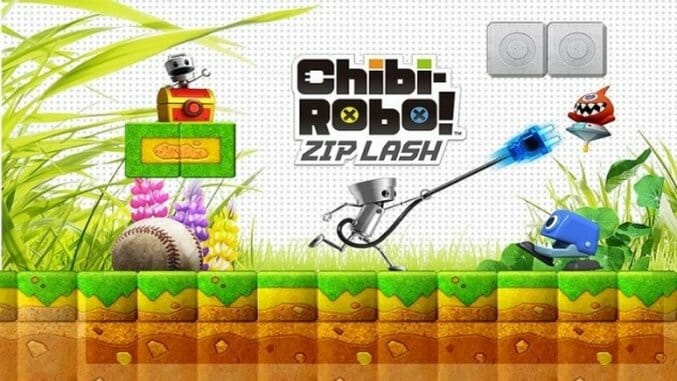Chibi-Robo! Zip Lash: Plugged In

You expect product placement in sports games. That’s why sports exist: to advertise things. It’s weird, though, when Chibi-Robo turns into a tiny garbage robot and picks up a bag of Utz potato chips. One second he’s zipping around these complex obstacle courses filled with secrets and villains, the next he’s feeding Mentos to a talking toy plane who comes really close to spouting ad copy. If this is what it takes to underwrite a new Chibi-Robo game, or at least to bring it to America, then that’s fine. But it’s still a little off-putting, and worse, says something pretty sad about the state of games today. Could a game as cute and whimsical and minor (not an insult) as this, that doesn’t star one of Nintendo’s big marketable characters or slot into a currently popular genre, exist without the ads? If not, what’s happened to this industry?
Chibi-Robo! Zip Lash feels slight, the way most non-RPG handheld games used to feel. The Game Boy was something you played when you couldn’t play anything else, and its stock-in-trade came in two varieties: long, grinding epics perfect for endless summer car trips, and small-scale diversions for killing time as efficiently as possible. Chibi-Robo! Zip Lash fits into that second category, but like the best of those games (pretty much any handheld Super Mario) it’s not slight on fun or vision. It’s an inventive slice of pure play that doesn’t feel like any other game for the 3DS.
Chibi-Robo uses his power cord to whip and grapple his way through situations that would only be perilous to a robot as big as a McNugget. Although a simple tool when used as a whip (hit a thing and it explodes), the cord becomes a multi-purpose tool as the game introduces ingenious uses for its long-range deployment, from grabbing hold of ledges and objects that would otherwise be out of reach, to richocheting between banked walls to attain the otherwise unattainable. The scope of Chibi-Robo’s abilities expands incrementally, and the level design consistently has this growth in mind, with both progression and the discovery of various collectibles depending on the player’s ability to use all of Chibi-Robo’s skills. In other words, it’s constructed the way a good platformer should be.
It also immediately builds its own unique world, and proceeds to keep it fresh and inviting throughout the whole game. It’s a place where the only thing cuter than a tiny world-saving robot is his flying television friend and the mischievous aliens making a mess of everything. Occasionally Chibi-Robo will encounter a recognizable real-world artifact that drives home the minute sense of scale at work, as when he has to pick up a crushed Dixie cup or other piece of trash. (As always, he likes to keep things neat.) As in Pikmin, that perspective gives the game a toy box feel that increases the already ample amount of charm. Aesthetically it’s unlike any of Nintendo’s many other platformers, and the company continues to find new territory within perhaps its most well-explored genre.
-

-

-

-

-

-

-

-

-

-

-

-

-

-

-

-

-

-

-

-

-

-

-

-

-

-

-

-

-

-

-

-

-

-

-

-

-

-

-

-









































